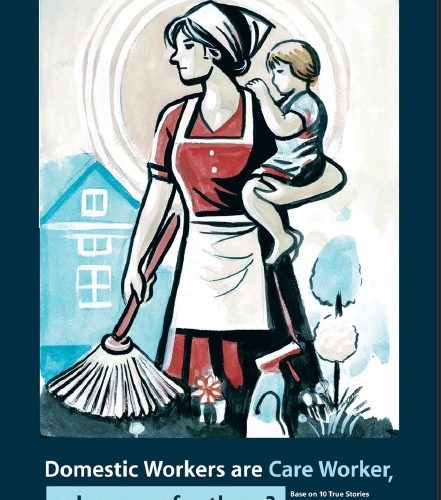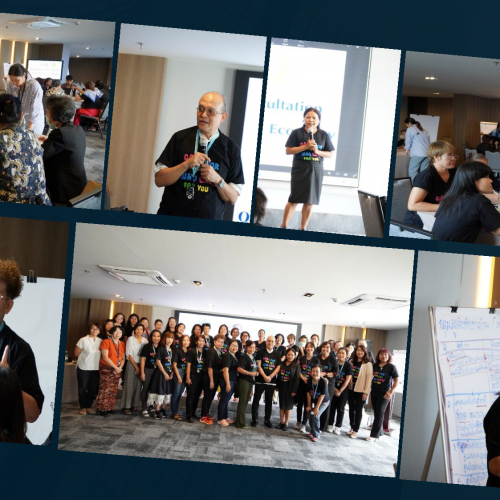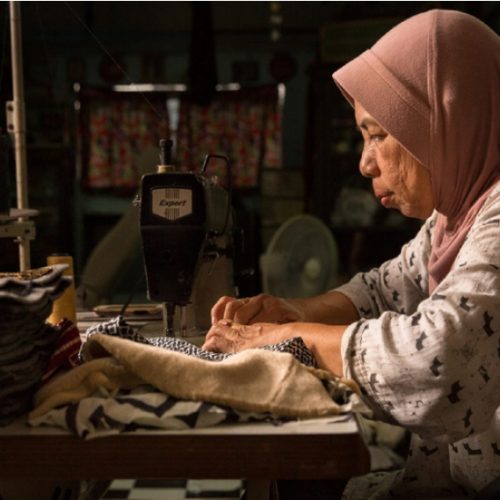
I am Watchaley Petchburi, 57 years old, from Suphanburi province in Thailand. I completed my high school degree from the Office for the Promotion of Non-Formal and Informal Education (NFE) and moved to Bangkok at the age of 18 to help my brother’s family raise their children. After living with them for some years, I wanted to be financially independent, so I found work in a garment knitting factory. When I got married and had two children, I switched to food business. Cooking and selling food allowed me to raise my children without having to rely on anyone. It is a tiring job but I was working independently and could give time to my children.
“Every day as soon as I woke up I had to think of preparing food for my husband and children, I had to make sure that everyone was well looked after, then I had to cook and sell food per orders. There was always a lot of housework to do. It would be almost noon when I could eat and take some rest. My day ended almost 11:00 PM every day.”
I worked in food business as long as my health allowed it. When I had health problems our income went down and my family found it hard to cope with the cost of living in Bangkok. We had to relocate often to find affordable accommodation. Finally, we came to stay in Lam Pha-Ong in Nong Chok District. My health was deteriorating and children had grown up so I decided to become a Public Health Volunteer. I wanted to do some work in our community.
My own life experiences and now observing the lives of many other women makes me think seriously about our society.
“Why do women have to work outside the home to earn money and also take care of their husbands and children? Why housework is only women’s work? Why don’t other people in the house help us? I look at our group in the village, all 20 women members of our group have the same problem. Every day around 5 PM, after a long day’s work outside, all of them have to rush home to cook and clean for the family. I think that cooking and cleaning the house shouldn’t be only the responsibility of women. Everyone in the house should help each other in housework, whether the person is a man or a woman”
As a community volunteer, I have attended many trainings and learnt about many things. I apply the knowledge in my work and try to help members of the community. Seeing my failing health, my neighbours ask me, “Going out again? Why do you go? Why don’t you just stay at home?” But I talk to my family and they understand me. Every time I participate in activities, I get some ideas to help the community, and I also create a network that is ready to help the community.
One of the courses that I attended was on Women’s Rights and Gender Equality. An insight from that course has stayed with me – “Before changing others, we should start with ourselves first, talk to yourself, understand yourself, know your needs first. And then gradually understand the people that you are close to and your family to create mutual understanding that everyone needs personal time.”
I applied the learning on myself. I told myself that if I continue the way I was going, I will be in trouble. I can’t keep doing everything alone. So, I started talking to my family that they must change their ways and start sharing housework. They can’t leave it all to me. I am the mom and the wife but I can’t do all work at home alone. Everyone must help each other and share the work at home. If one is busy, another person in the house will have to perform that role instead. This was a new thing and I think I started late. But better late than never. Soon I noticed some change in our household.
The COVID-19 epidemic situation made me see more violence against women in my community. Both physical and mental. In my role as a community leader, I have tried to help fellow women in my community in the following ways:
I let the women release the stress and anxiety in their mind. Sometimes, even if one can’t really help them, listening to their problems is also helpful. I ask them about their needs for help. I suggest ways to solve the problem including by working together.
In one family the husband was infected with COVID-19 and he had to be quarantined. He was looked after by his wife. After he got well, he went back to the company without bothering to take care of other people at home. There are elderly people and children in the family. The wife was very stressed in this situation. She did not know what to do. She had just given birth and was not physically very fit. I consider this psychological violence. I couldn’t do anything for her but I listened to her.
Another woman in our community, in addition to doing all housework alone, she also works outside the home. But nowadays, she has taken up yet another work. After her regular job and then her housework, she sells bread to earn a little additional income for the family. Her husband has just been released from prison after being charged with drugs possession; the society does not accept him so he can’t find work. So I encouraged her to apply for a loan from the community and open a grilled chicken shop and make everyone in the family share the work.
There are many forms of gender-based violence in Thai society, both visible as being attacked on the body and invisible, such as hurtful words which hurt our hearts. These can be prevented if we try at the family level. We can try to bring about change in our attitude. We can start with our children. If children learn to respect women and think of them as equal when they are young, many problems can be solved.

As a community volunteer I would like to ask the Government to help enact the Domestic Violence Victim Protection Act that can actually be enforced and help the person in a timely manner. I would like to see psychological violence addressed too. It is something that we can’t see on a person’s body but it can destroy her life. Domestic violence is a challenging issue because neighbours do not want to interfere thinking that it is private matter, and the police also does not accept the report of the case saying that it is just a family affair. So where would a victim of domestic violence go? Especially one whose wounds no one can see.
(Interview and transcription in Thai by Wanida Kotchasarn, HomeNet Thailand. Translation by Kanchana Di-ut.)






